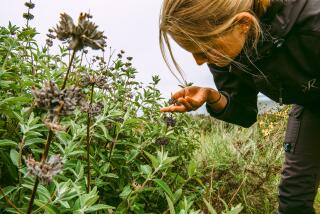Getting People to Jump on the Bat Bandwagon : The often maligned animals actually destroy tons of harmful insects and help in reforestation.
- Share via
On Valentine’s Day an acquaintance gave me a chocolate candy about the size of a bagel--but it was in the shape of a bat. Clearly a token of affection, and as it turns out, environmental meaning.
But first, I showed this valentine to my teen-age daughter, the household’s expert on modern trends in social usage. “Ugh, twisted,” was her preliminary finding.
Indeed, it was her final position on the matter even though I tried to point out, by reading aloud from some literature accompanying the gift, that some people, such as the American Bat Conservation Society, which sells this curious confection, think otherwise. To fight prevailing negative attitudes about bats, two national organizations and some local folks have become quite active lately.
“Bats are cute, adorable and lovable and it’s time to associate bats with a holiday that better represents their disposition,” writes Dr. Tom Valega. He’s president of the Maryland-based group that came up with the impossible-to-forget concept of giving your loved one a “Bat Bite,” as these copyrighted candies are called, on Valentine’s Day.
By coincidence, this week I was given the names of some Ventura-based environmental activists who also think bats deserve an image make-over. I checked in with Dee and John Lockwood, a couple who own agricultural land hereabouts. “Bats are the most beneficial mammal on the planet,” John told me. “The bat is responsible for 90% of the reforestation of the harvested rain forest.”
It seems that it is bats, not birds, that scatter fresh seeds wherever humans have come in and devastated acres of tropical rain forest. And, referring to California’s ecology, John quipped, “What does the spotted owl do for us, or the coyote, when a cave of bats can fly out and eat 250,000 pounds of insects a night.”
Dee and John trek annually to Central America on a private crusade to instruct tradition-bound farmers not to torch bat colonies in mountain caves. “We’re protecting Ventura County bats in Mexico,” John said, referring to the migratory patterns of some of these animals.
Certain breeds go back and forth across the border devouring moths and mosquitoes at the rate of 600 per bat per hour. John cited a specific commercial benefit: “By encouraging bats (by not killing them) some farmers have been successful in reducing the volume of pesticides needed to keep the corn borer in check.”
Other bats stay in southern Mexico and Belize all the time, existing on a vegetarian diet. They provide a pro-environmental service by scattering undigested seeds in natural fertilizer pellets, thus re-seeding land in their area, the Lockwoods say.
Their statements were echoed by the professionals that I contacted at the state of California’s Wildlife Management Division and at another, long established private group, Bat Conservation International.
“Bats have undergone an outrageous decline in the last 50 years (which) leads to increase in insects and pesticide use,” says Caryla Larsen, a wildlife biologist with the state’s animal-watching organization. “People are afraid of them, but they’re beneficial. They are not considered a threat.”
Rabies incidents involving bats are low, she reports--”in a healthy bat colony one-tenth of 1%.”
But she stressed that we should not disturb or handle them, and we should instruct our children in the same way. It’s also illegal to have them as pets. The purpose of erecting a bat house on your property, as some people do, should not be to domesticate them, she said, but give them shelter.
Rather than adopt a bat, I plan to hop on the bat bandwagon later this year when the folks who sell the Bat Bite chocolates come out with their new model. It’s going to be keyed to yet another holiday, Halloween, and will have a filling of raspberry jam.
Details
* FYI:For information about nearby bats call Dee and John Lockwood at 642-3111 or Caryla Larsen of the Wildlife Management Division, state of California, (916) 654-3806.
* ETC: Recommended books and videos on bats are available from Bat Conservation International (800) 538-BATS. For chocolate bats call the American Bat Conservation Society at (301) 309-6610.
More to Read
Sign up for Essential California
The most important California stories and recommendations in your inbox every morning.
You may occasionally receive promotional content from the Los Angeles Times.













